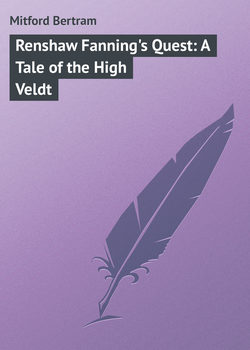Читать книгу Renshaw Fanning's Quest: A Tale of the High Veldt - Mitford Bertram - Страница 1
Prologue
Оглавление“Just consider! You would soon get to hate me. I should be the ruin of you.”
Thus the owner of the bright, sparkling face which was turned, half mockingly, half ruefully, upon that of her companion. Looking out killingly from under the broad-brimmed hat, the dark, lustrous eyes seemed to melt into his.
“How can you say such a thing?” was the reply, in the deep, half-tremulous tone of a man who is in dead earnest. “How can you say such a thing?” he repeated involuntarily, driving a spur into his horse’s flank with a dig that made that spirited animal curvet and prance beneath the restraining curb.
“Oh, take care! you are making my horse restive. And I am such a bad rider, as you know!” And the lithe, graceful figure in the well-fitting habit was thrown into the relief involved by a real physical effort. “How can I say so?” she went on; “how can I say so? Why, it is only candid on my part. Do you seriously think a butterfly like me is cut out for a life on the High Veldt?”
The man’s bronzed features faded to a ghastly paleness. He averted his head for some moments, as though with a wild instinctive idea of breaking the spell that was upon him. Overhead towered the stately cone of a great mountain, soaring aloft in the summer haze. Around, in undulating sweep, the bushclad slopes shut in the tortuous, stony road. Birds piped and called to one another in the lustrous sunlight, and the rich sensuous air was alive with the drowsy boom of bees and the metallic plash of the river in its rocky bed beneath.
“There are other and pleasanter places in this country than the High Veldt,” he said at last, but in the tone of an advocate pleading a hopeless cause, and that cause his own.
“But even then,” she rejoined, her voice softening as though in compunction over the final stab she was about to inflict, “even then – no one is less qualified to make you happy than I am, believe me. Why, you don’t really know me as I am! Sometimes I think I hardly know myself.”
“You do yourself injustice,” he said. “Give me the opportunity of proving it.”
A curious passing spasm – a kind of a stormy look – shot across the beautiful face.
“You are too generous,” she replied vehemently, “and far too good to be made miserable for life by such a little wretch as I am. Better, far, feel a little sorry now than that.”
“And you are underrating yourself. But I will not hurry you. Take time; but oh, my darling, don’t tell me that what you said just now is your final answer.”
“I must tell you that very thing. It cuts me to the heart to give you pain; and that is more than I have been able to say before to any man living. But – there are reasons – if you only knew. There. Forget that I ever said that. But I know that with you anything I may say is as safe as death itself.”
This time he made no reply. For one brief instant their eyes met, and in that instant he understood her; understood, too, that her first answer was final.
Yet he was goodly to look upon, this man, with his splendid physique, and refined, noble countenance. Many a feminine heart, we trow, would have beat quicker – but with vivid joy – at such words as he had addressed to his present companion. Many a pair of eyes would have brightened gladsomely into a quick love-light. Many another would have desired no better protector and stay until her life’s end than this man now riding by the side of her who had rejected him.
To propose on horseback is the very worst place a man can choose wherein to propose, says some one or other, by reason of both the proposer and proposee being in a measure subject to the precarious whims of one or a pair of wholly unreliable quadrupeds. He who now rode there had either never heard that salutary axiom or had forgotten it for the occasion; but now he was made to feel its force by a male voice, some little distance ahead, hallooing —
“Now, you two good people, spur up, or we shall never get there to-night!”
And a bend in the road brought into view other horsemen – other “habits” – stationary, and obviously and provokingly awaiting the arrival of the two laggards.
And the equestrians, now merged into one group, rode on their way in the golden sunlight of that lovely afternoon, rejoicing in the exquisite glories of the wild and romantic mountain road. But, in the prevailing mirth, one among them bore no part, for he carried within his breast the dead burden of a sore and aching heart.
